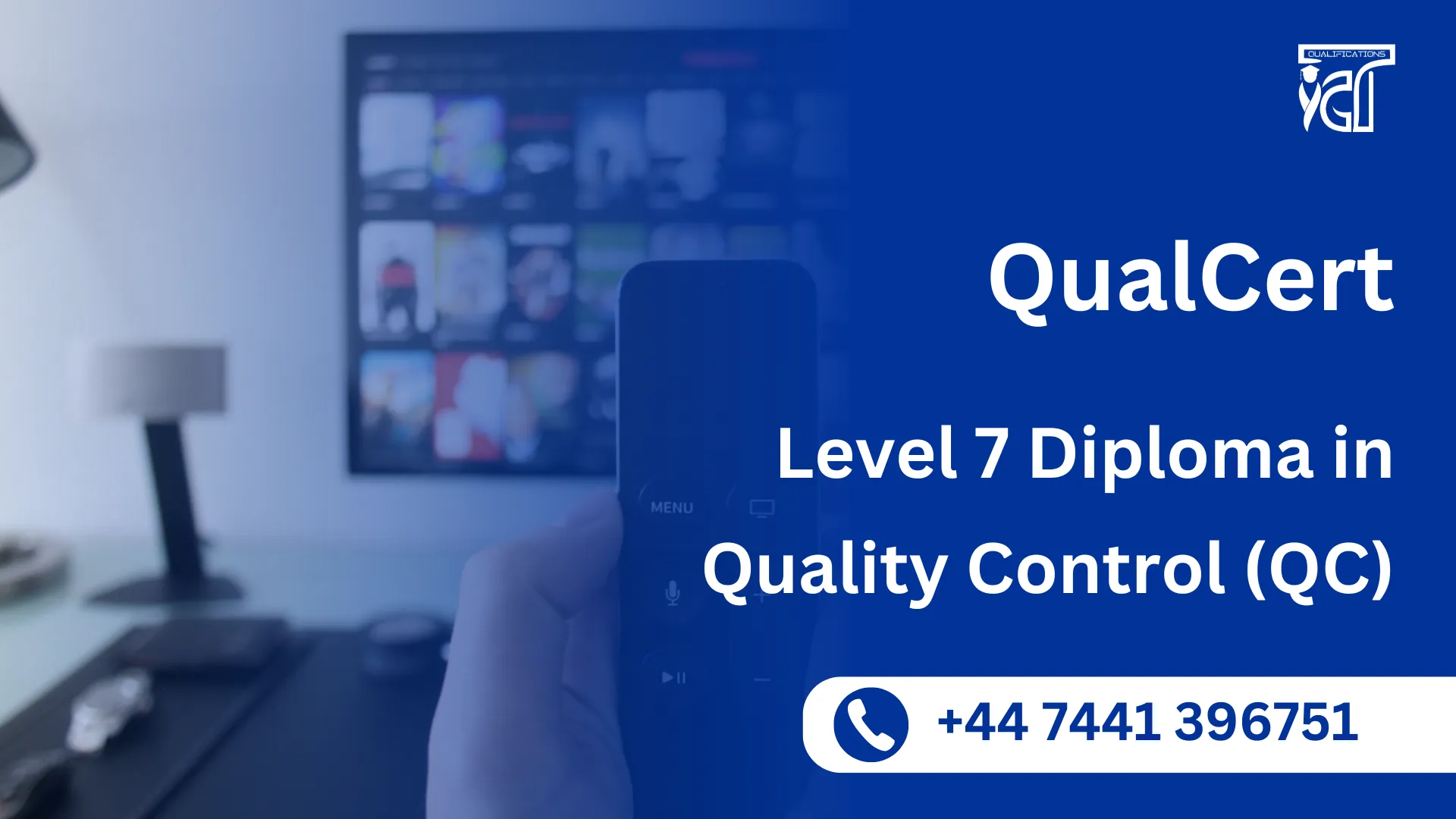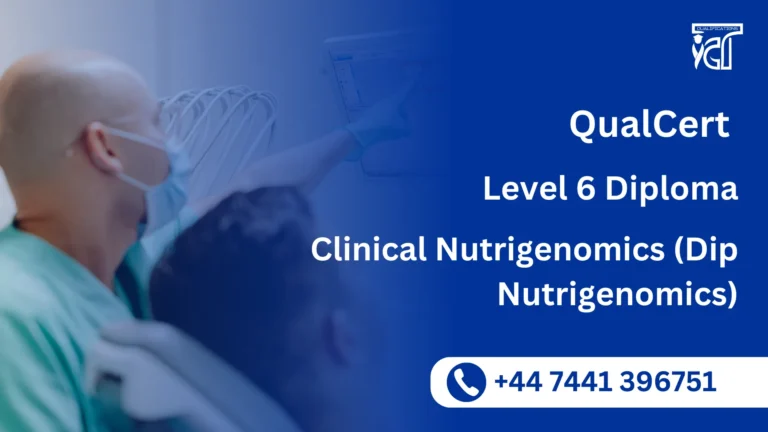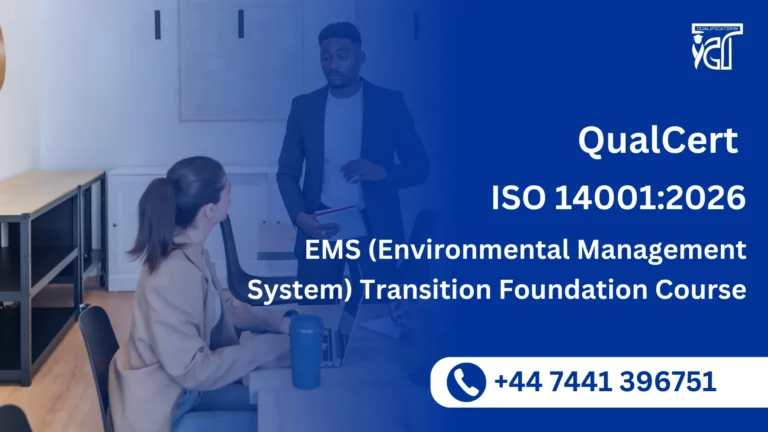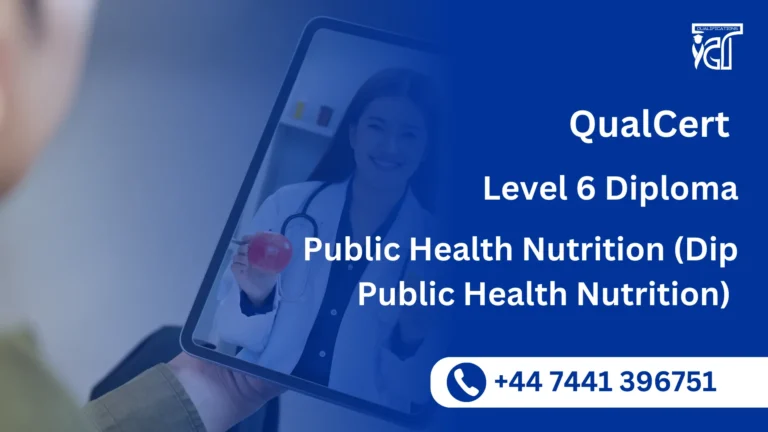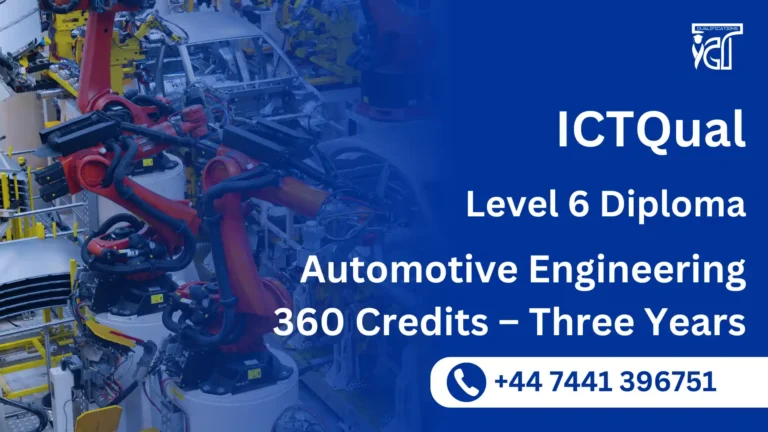In the rapidly evolving world of business, ensuring quality and compliance has become a top priority for companies across industries. From manufacturing to service sectors, the role of Quality Control (QC) professionals is indispensable in maintaining consistency, reliability, and customer satisfaction. The QualCert Level 7 Diploma in Quality Control (QC) is a prestigious, Ofqual-regulated qualification that provides professionals with advanced knowledge and skills to excel in high-level QC roles.
This qualification is designed for individuals aiming to specialize in quality management, process optimization, and compliance assurance. Whether you’re a seasoned quality professional or an aspiring manager in quality control, this diploma offers the tools needed to take your career to the next level.
The QualCert Level 7 Diploma in Quality Control (QC) is a comprehensive program that combines advanced theories with practical skills in quality management, regulatory compliance, and continuous improvement. This qualification is tailored to meet the needs of individuals seeking managerial positions in QC or those looking to enhance their expertise in high-level quality control systems.
As an Ofqual-regulated qualification, the Level 7 Diploma adheres to rigorous academic standards and is recognized by employers and professional bodies worldwide. The course is delivered through flexible online learning, making it accessible to professionals balancing work and study.
The QualCert Level 7 Diploma in Quality Control (QC) is an advanced qualification designed to equip you with the strategic skills needed to lead quality control and assurance efforts at the highest levels. Whether you’re looking to advance in your current role or transition into a senior leadership position, this diploma provides the expertise and credentials to achieve your career goals.
Enroll today to gain the qualifications and skills necessary to lead quality excellence in your organization and drive continuous improvement across your industry.
QualCert Level 7 Diploma in Quality Control (QC)
This QualCert Level 7 Diploma in Quality Control (QC) course offers 120 Credits, requiring a Total Qualification Time (TQT) of 1200 hours, including 600 Guided Learning Hours (GLH). It is designed for efficient and focused skill development in Quality Control (QC).
| Unit Ref# | Unit Title | Credit | GLH | TQT |
| QC01013 – 1 | Strategic Leadership in Quality Control | 20 | 100 | 200 |
| QC01013 – 2 | Advanced Quality Control Systems in Large Infrastructure Projects | 20 | 100 | 200 |
| QC01013 – 3 | Risk and Crisis Management in QC Projects | 20 | 100 | 200 |
| QC01013 – 4 | Advanced Data Analytics for QC in Construction | 20 | 100 | 200 |
| QC01013 – 5 | Research Methodology in Quality Control | 20 | 100 | 200 |
| QC01013 – 6 | Sustainability and Innovation in QC Systems | 20 | 100 | 200 |
GLH (Guided Learning Hours) and TQT (Total Qualification Time) are terms commonly used in vocational qualifications to help define the amount of time a learner is expected to spend on their studies.
1. GLH (Guided Learning Hours)
GLH refers to the number of hours a learner spends being directly taught, supervised, or supported during their course. This includes the time spent in activities such as:
- Classroom instruction
- Practical workshops
- One-on-one tutoring or mentoring sessions
- Online learning sessions with tutor support
In other words, GLH represents the time that learners are actively engaged with their instructors or learning activities.
2. TQT (Total Qualification Time)
TQT represents the total amount of time a learner is expected to invest in completing a qualification, including:
- GLH (Guided Learning Hours): Time spent on direct learning, as explained above.
- Self-Directed Learning: This includes time spent on independent study, research, assignment completion, preparation for exams, and any other work the learner does outside of direct teaching hours.
TQT is a broader measure that includes all the time required to achieve the qualification. It helps learners and employers understand the overall commitment required for the qualification.
Key Differences Between GLH and TQT:
- GLH focuses on direct learning with guidance or supervision.
- TQT includes GLH as well as independent study time and other learning-related activities.
Example:
If a qualification has a TQT of 600 hours and a GLH of 250 hours, it means the learner should spend 250 hours in direct learning (classroom, online, or tutor-led sessions) and 350 hours on independent study or research.
Upon successful completion of the Level 7 Diploma in Quality Control, students will demonstrate proficiency in the following advanced areas of quality management:
Strategic Leadership in Quality Control
- Develop advanced leadership strategies to drive quality control initiatives within complex organizations.
- Demonstrate the ability to inspire and lead cross-functional teams toward achieving quality objectives.
- Analyze and implement organizational frameworks for sustained quality improvements.
- Evaluate the role of leadership in fostering a quality-focused organizational culture.
Advanced Quality Control Systems in Large Infrastructure Projects
- Apply advanced quality control methodologies to large-scale infrastructure projects.
- Understand the complexities of implementing quality systems in multi-phase and multi-stakeholder projects.
- Evaluate industry-specific quality standards and ensure compliance with regulatory requirements.
- Design robust quality frameworks tailored to infrastructure development and management.
Risk and Crisis Management in QC Projects
- Identify potential risks and quality issues in large-scale projects and develop mitigation strategies.
- Demonstrate crisis management skills to address quality-related challenges effectively.
- Develop contingency plans to minimize disruptions in quality assurance processes.
- Integrate risk assessment methodologies into project planning and execution.
Advanced Data Analytics for QC in Construction
- Use advanced data analytics tools to monitor and improve quality control processes in construction projects.
- Analyze large datasets to identify trends, deviations, and root causes of quality issues.
- Implement predictive analytics to prevent quality failures in construction projects.
- Demonstrate proficiency in data visualization techniques for effective decision-making.
Research Methodology in Quality Control
- Develop research proposals focused on addressing critical issues in quality control.
- Employ qualitative and quantitative research methods to investigate QC challenges.
- Analyze research findings to provide actionable insights for quality improvement.
- Present research outcomes in a professional and impactful manner.
Sustainability and Innovation in QC Systems
- Evaluate the role of sustainability in modern quality control systems.
- Design and implement innovative QC practices that align with environmental and social governance standards.
- Assess the impact of sustainable practices on long-term operational excellence.
- Integrate emerging technologies and innovations to enhance quality control systems.
Benefits of the QualCert Level 7 Diploma in Quality Control (QC)
The QualCert Level 7 Diploma in Quality Control (QC) offers professionals a powerful blend of advanced knowledge, strategic insights, and practical expertise—making it an ideal choice for those aiming to lead in the field of quality management. Below are the key benefits of pursuing this Ofqual-regulated, globally recognized qualification:
1. Ofqual-Regulated & Internationally Recognized
This diploma is accredited by Ofqual, ensuring it meets the highest UK education standards. It’s accepted by employers and institutions worldwide, giving you a competitive edge in the global job market.
2. Prepares You for Senior and Strategic Roles
Designed for professionals at or approaching management level, this course equips you with the leadership and technical capabilities needed to take on roles such as Quality Control Manager, Head of Quality Assurance, or Quality Systems Director.
3. 100% Assignment-Based – No Exams
All assessments are based on real-world assignments. This practical format allows you to demonstrate your skills through workplace-relevant projects, making learning more applicable and less exam-focused.
4. Comprehensive, Advanced Curriculum
You’ll master essential topics such as ISO standards, regulatory compliance, risk management, lean quality, and data-driven decision-making—skills that are critical in today’s quality-focused industries.
5. Flexible Online Learning
Study from anywhere in the world, at your own pace. The flexible delivery model is perfect for full-time professionals who want to earn a high-level qualification without putting their career on hold.
6. Enhanced Leadership and Management Skills
You’ll develop the ability to lead quality-focused teams, implement organizational change, and drive a culture of continuous improvement within your company.
7. Boosted Career Prospects and Salary Potential
This Level 7 diploma significantly increases your chances of promotion and qualifies you for higher-paying roles across various sectors such as manufacturing, pharmaceuticals, engineering, logistics, and food production.
8. Builds Expertise in Quality Systems and Auditing
Develop high-level competency in conducting internal audits, managing compliance programs, and aligning organizational practices with international quality standards like ISO 9001.
9. Foundation for Further Specialization
Graduates can pursue Lean Six Sigma Black Belt Certification, ISO Lead Auditor qualifications, or even progress to executive leadership training in Operational Excellence and Total Quality Management (TQM).
10. Supports Organizational Growth and Continuous Improvement
By implementing the skills gained in this program, you can help your organization reduce costs, improve product quality, meet regulatory demands, and increase overall customer satisfaction.
By earning the QualCert Level 7 Diploma in Quality Control, you’re not just advancing your career—you’re becoming a strategic leader in quality excellence.
The Level 7 Diploma in Quality Control is specifically designed for experienced professionals who are looking to advance their careers in quality management and take on senior leadership roles within their organizations. This diploma program is ideal for:
1. Senior Quality Control Professionals
- Quality Control Managers: Individuals currently leading quality control departments who seek to deepen their expertise and strategic capabilities.
- Quality Assurance Directors: Professionals responsible for overseeing quality assurance practices and ensuring compliance with industry standards.
- Senior Quality Engineers: Engineers with extensive experience in quality assurance and control who aspire to advance their careers in leadership roles.
2. Quality Management Leaders
- Chief Quality Officers (CQO): Executives tasked with developing and implementing organizational quality strategies and ensuring continuous improvement.
- Quality Management Consultants: Consultants providing specialized guidance on quality management practices and helping organizations achieve operational excellence.
- Senior Operations Managers: Managers overseeing production and operational processes who recognize the importance of quality management in achieving business goals.
3. Industry Specialists
- Manufacturing Sector Professionals: Individuals working in manufacturing industries where maintaining high-quality standards is critical for product reliability and customer satisfaction.
- Healthcare and Pharmaceutical Experts: Professionals in healthcare and pharmaceutical sectors where stringent quality control measures are essential for regulatory compliance and patient safety.
- Food and Beverage Industry Leaders: Leaders in food and beverage industries focusing on ensuring quality and safety standards throughout production and distribution processes.
4. Continuous Improvement Champions
- Six Sigma Black Belts and Master Black Belts: Certified professionals in Six Sigma methodologies looking to expand their knowledge and skills in quality management.
- Lean Practitioners: Practitioners of Lean principles who want to integrate advanced quality control techniques into lean initiatives for process optimization.
- Continuous Improvement Managers: Professionals dedicated to driving continuous improvement initiatives across organizational functions.
5. Strategic Decision Makers
- C-Level Executives and Directors: Senior executives and board members who understand the strategic value of quality management in achieving organizational excellence and competitive advantage.
- Policy Makers and Government Officials: Individuals involved in policy-making and regulatory affairs related to quality control and assurance.
6. Educators and Researchers
- Academic Leaders: Professors and educators in quality management disciplines who seek to enhance their teaching credentials and contribute to academic research in quality control.
- Researchers: Scholars and researchers focusing on advancing knowledge and practices in quality management through empirical research and case studies.
7. Career Advancers and Career Switchers
- Professionals Seeking Career Advancement: Individuals looking to accelerate their career progression and enhance their marketability through advanced qualifications in quality control.
- Career Switchers: Professionals transitioning into quality management roles from other fields such as engineering, operations, or project management.
8. Entrepreneurs and Small Business Owners
- Business Owners: Entrepreneurs and small business owners aiming to implement robust quality management systems to enhance product quality and customer satisfaction.
- Startup Founders: Founders of startups in manufacturing or service sectors who recognize the strategic advantage of quality management in scaling their businesses.
Entry Requirements
Register Now
Qualification Process
Qualification Process for the QualCert Level 7 Diploma in Quality Control (QC)
- Self-Assessment:
Begin by evaluating your eligibility to ensure you meet the qualification requirements, including work experience, knowledge, and language proficiency. - Registration:
Complete your registration by submitting the required documents, including a scanned copy of a valid ID, and paying the registration fee. - Induction:
An assessor will conduct an induction to confirm your eligibility for the course and explain the evidence requirements. If you do not meet the criteria, your registration will be canceled, and the fee will be refunded. - Assignmnets & Evidence Submission:
Provide all assignmnets and the necessary evidence based on the assessment criteria outlined in the course. If you are unsure of the required evidence, consult with the assessor for guidance on the type and nature of evidence needed. - Feedback and Revision:
The assessor will review your submitted evidence and provide feedback. Evidence that meets the criteria will be marked as “Criteria Met,” while any gaps will be identified. You will be asked to revise and resubmit if needed. - Competence Evidence:
Submit final evidence demonstrating that all learning outcomes have been met. This evidence will be marked as “Criteria Met” by the assessor once it is satisfactory. - Internal Quality Assurance (IQA):
The Internal Quality Assurance Verifier (IQA) will review your evidence to ensure consistency, quality, and compliance with standards. - External Verification:
The IQA will submit your portfolio to QualCert External Quality Assurance Verifiers (EQA) for final confirmation. The EQA may contact you directly to verify the authenticity of your evidence. - Certification:
Upon successful completion of all checks, QualCert will issue your official certificate, confirming that you have attained the QualCert Level 7 Diploma in Quality Control (QC).

